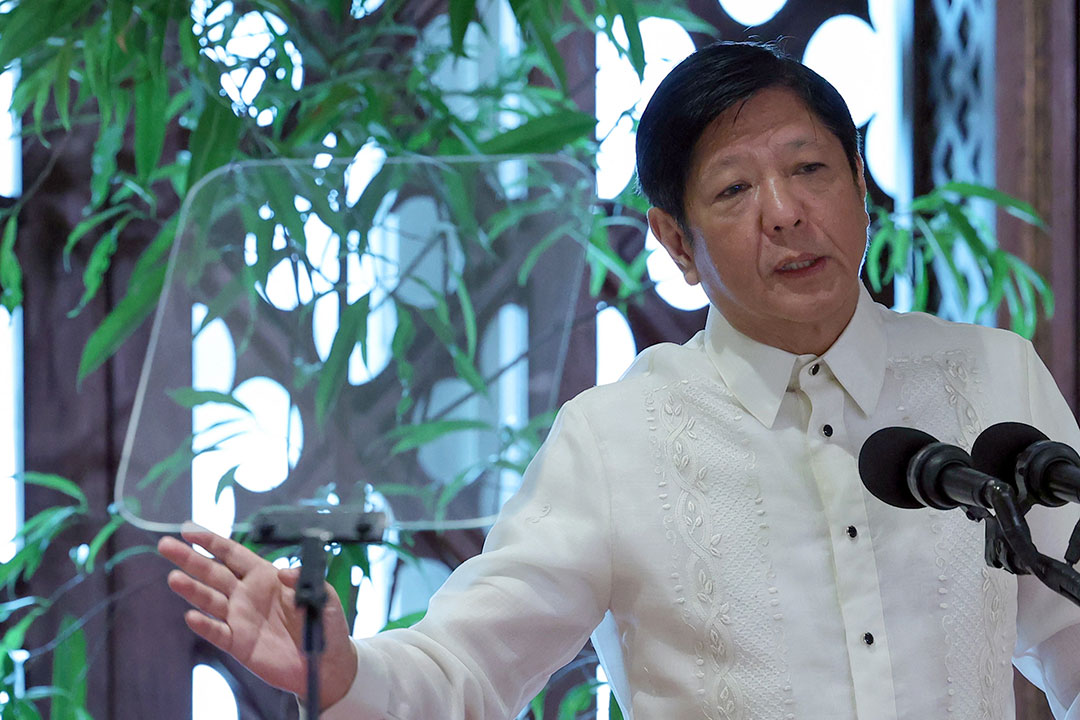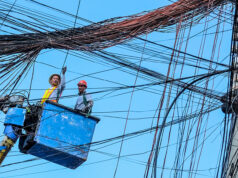Marcos says Maharlika fund will start operating by yearend

By Kyle Aristophere T. Atienza, Reporter
THE PHILIPPINES’ first sovereign wealth fund will start operating by yearend, President Ferdinand R. Marcos, Jr. said on Thursday after suspending it supposedly to improve its organizational structure.
“The organization of the Maharlika fund proceeds apace,” he said before leaving for Saudi Arabia, where he is expected to promote the fund.
“We have found more improvements we can make, specifically to the organizational structure of the Maharlika fund,” he added, amid criticisms that the wealth fund threatens the financial stability of two state banks.
Mr. Marcos said the concept of the Maharlika Investment Fund (MIF) “remains a good one” and therefore, “we are still committed to having it operational before the end of the year.”
The Oct. 12 memorandum ordering the suspension of the MIF law’s implementing rules and regulations (IRR) was addressed to the Bureau of the Treasury as well as the heads of the Land Bank of the Philippines (LANDBANK) and the Development Bank of the Philippines (DBP).
The President insisted that the suspension must not be seen as “a judgment of the rightness or wrongness of the Maharlika fund.”
“On the contrary, we are just finding ways to make it as close to perfect and ideal as possible, and that is what we have done,” Mr. Marcos said, adding that he consulted economic managers and other people who would be involved in the fund’s operations.
“Their inputs had been very important and that is why we are now going to utilize them to make it a better organization.”
In a statement, Budget Secretary Amenah F. Pangandaman said the economic team will work closely with the President “to prudently review all provisions line by line and make sure that all things are in order.”
“We will also take this opportunity to engage in more multi-stakeholder groundwork in preparation for the launch of the MIF.”
DAMAGE TO CREDIBILITY?
If the issue is just a matter of improving the organizational structure of the investment fund, “why suspend the whole of Maharlika,” Action for Economic Reforms coordinator Filomeno S. Sta. Ana III said in a Facebook Messenger chat.
“This shows an utter failure of communication. Or it shows the confusion in Malacañang,” he said. “This further damages the leadership’s credibility.”
Mr. Sta. Ana noted that the Philippine government’s credibility matters most for investors.
Enrico P. Villanueva, a senior lecturer at the University of the Philippines Los Baños, expressed doubt if the MIF could start operations before yearend when there’s only just two and a half months to go.
“Making a new fund operational in that limited time period is implausible. The IRR revision may take at least two weeks or even more than two months depending on how serious the administration is in making the rules better,” he said via Messenger chat.
Earlier, observers said the suspension of the IRR may be aimed at allowing the President to have greater say on the choice of the Maharlika Investment Corp.’s top executives.
“Whether the President and the MIF proponents like it or not, the directive — to suspend the implementation of the IRR is an admission that something is wrong or amiss with the MIF — certainly in the IRR, and likely even in the law itself,” Mr. Villanueva said.
For GlobalSource Partners Country Analyst Diwa C. Guinigundo, the problem is not the fund’s organizational structure “but the whole concept of putting up a sovereign investment fund when we have chronic fiscal deficit and rising public debt.”
“It’s a missed opportunity for the President to rectify this piece of bad legislation,” he said in a Viber message. “With this very tentative mode of formulating and executing public policy, it would be difficult to inspire investment confidence and market support.”
Terry L. Ridon, a public investment analyst and convenor of think tank InfraWatch, said the IRR suspension should pave the way for the government to assess the performance of the LANDBANK and DBP which have remitted their contributions to the MIF.
“If the banks’ performance flounders in the next few months to at most a year, the government should reassess whether it should dive quickly into MIF investment or focus on strengthening the performance of government banks instead,” he said via Messenger chat.
The suspension of the Maharlika fund’s implementation came amid concerns on the financial stability of LANDBANK and DBP, which were required to contribute P50 billion and P25 billion, respectively, to the fund’s startup money.
After remitting their contributions, the two banks sought regulatory relief from the central bank’s capitalization requirements.
Earlier this month, Foreign Affairs Assistant Secretary Daniel R. Espiritu said Mr. Marcos is expected to promote the Maharlika fund during his meetings with investors on the sidelines of his participation in the first-ever summit between Southeast Asian and Gulf leaders today (Oct. 20).
Mr. Marcos, in his pre-departure speech, said his government was “encouraged by the reaction of our friends in the Middle East and for that matter around the world to the fund.”
“We’re very encouraged that we are going down the right path.”
Bayan Muna Chairman Neri J. Colmenares said that following the suspension of the MIF law’s IRR, the High Court should “see that the chief executive himself is now hesitant of his pet project and that there is indeed no need for its certification of urgency.”
“The Office of the President’s reason for stopping the MIF’s implementation is to “further study the plan” — meaning it was rushed and half-baked,” he said in a Thursday statement. “We urge the Supreme Court to decide on our petition against the constitutionality of the railroaded passage of the Maharlika law and forever prohibit this presidential abuse of the power to railroad legislative proceedings.”
Gary Ador Dionisio, dean of the De La Salle – College of Saint Benilde School of Diplomacy and Governance, said the government has failed to prove that it is capable of protecting public money.
“MIF is unnecessary and untenable to protect taxpayers’ money,” he said via Messenger chat. “A weak institution like the Philippines will always be prone to oligarchic interest.”



